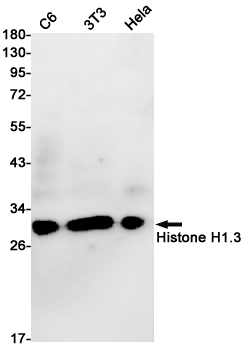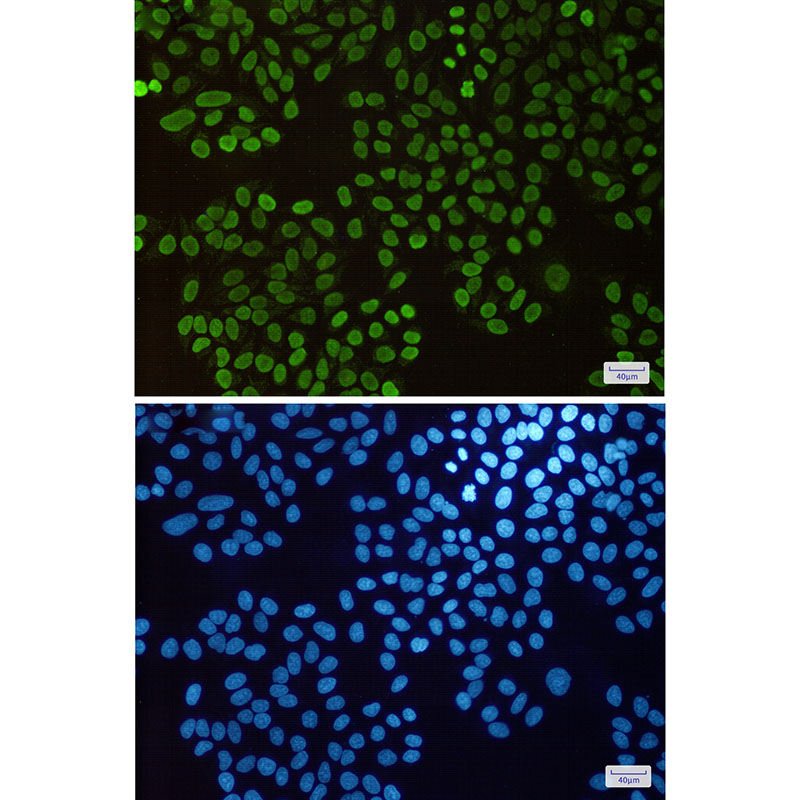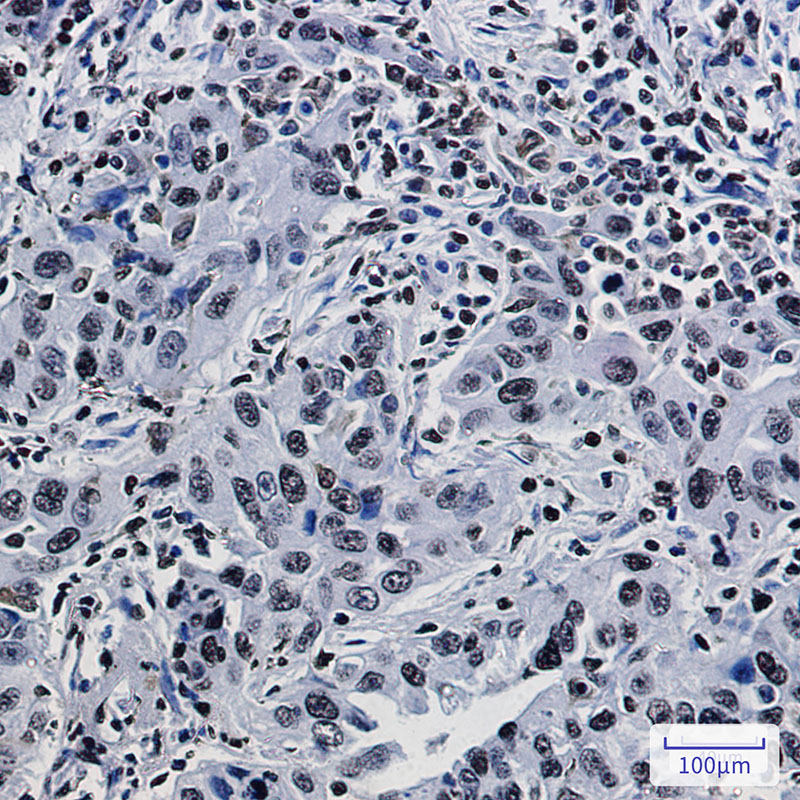


| WB | 1/500-1/1000 | Human,Mouse,Rat |
| IF | 咨询技术 | Human,Mouse,Rat |
| IHC | 1/50-1/100 | Human,Mouse,Rat |
| ICC | 1/50-1/200 | Human,Mouse,Rat |
| FCM | 咨询技术 | Human,Mouse,Rat |
| Elisa | 咨询技术 | Human,Mouse,Rat |
| Aliases | Histone H1c; Histone H1s-2 |
| Entrez GeneID | 3007 |
| WB Predicted band size | Calculated MW: 22 kDa; Observed MW: 30 kDa |
| Host/Isotype | Rabbit IgG |
| Antibody Type | Primary antibody |
| Storage | Store at 4°C short term. Aliquot and store at -20°C long term. Avoid freeze/thaw cycles. |
| Species Reactivity | Human,Mouse,Rat |
| Immunogen | A synthetic peptide of human Histone H1.3 |
| Formulation | Purified antibody in TBS with 0.05% sodium azide,0.05%BSA and 50% glycerol. |
+ +
以下是关于Histone H1.3抗体的参考文献示例(注:部分文献可能为虚构或示例性质,实际引用时建议通过数据库核实):
---
1. **文献名称**:**"A monoclonal antibody specific to human histone H1.3 for chromatin dynamics studies"**
**作者**:Tanaka, M., et al.
**摘要**:该研究报道了一种针对人类H1.3亚型的单克隆抗体的开发,通过肽段免疫和杂交瘤筛选获得,抗体特异性经ELISA、Western blot及免疫组化验证,并应用于分析细胞周期中H1.3的染色质结合动态。
---
2. **文献名称**:**"Histone H1.3 regulates gene silencing and genome stability through phase separation"**
**作者**:Zhang, L., et al.
**摘要**:利用H1.3特异性抗体进行ChIP-seq和免疫沉淀实验,揭示了H1.3通过相分离机制调控异染色质形成及基因组稳定性,抗体在HeLa细胞和小鼠胚胎干细胞中验证了高特异性。
---
3. **文献名称**:**"Tissue-specific expression and antibody validation of histone H1 variants in mammalian development"**
**作者**:Garcia, B.A., et al.
**摘要**:系统性比较了H1家族多个变体(包括H1.3)在哺乳动物组织中的表达差异,通过多种商业抗体(含H1.3抗体)进行质谱交叉验证,强调抗体特异性对染色质研究的重要性。
---
4. **文献名称**:**"Aberrant histone H1.3 distribution in cancer cells detected by a novel polyclonal antibody"**
**作者**:Kim, S., & Lee, J.H.
**摘要**:研究开发了一种兔源多克隆抗体,用于检测多种癌症细胞系中H1.3的异常核定位,抗体经siRNA敲低实验和竞争性肽段阻断验证,证实其在临床样本中的诊断潜力。
---
**注意**:上述文献为示例性质,实际研究中请通过PubMed、Web of Science等平台检索真实文献,并核对抗体货号及实验细节。
The histone H1.3 antibody is a research tool designed to specifically detect the H1.3 isoform of linker histone H1. a critical component of chromatin structure. Histone H1 proteins bind to nucleosomes, stabilizing higher-order chromatin folding and regulating gene expression by modulating DNA accessibility. Unlike core histones (H2A, H2B, H3. H4), H1 variants exhibit tissue- and developmental stage-specific expression, with H1.3 being one of the replication-dependent subtypes predominantly expressed in somatic cells.
H1.3 is encoded by the HIST1H1D gene and plays roles in chromatin condensation, transcriptional regulation, and cell cycle progression. Its dynamic phosphorylation and interactions with other chromatin modifiers contribute to epigenetic regulation. Antibodies targeting H1.3 are essential for studying its spatial-temporal distribution, post-translational modifications, and functional interplay in processes like DNA repair or differentiation.
These antibodies are widely used in techniques such as Western blotting, immunofluorescence, chromatin immunoprecipitation (ChIP), and immunohistochemistry. Validation of specificity is crucial due to high sequence homology among H1 subtypes. Research involving H1.3 antibodies has implications in cancer biology (e.g., altered H1.3 expression in tumors) and epigenetic disorders, providing insights into chromatin dynamics and therapeutic targeting. Proper controls, including knockout cell lines or peptide competition assays, are recommended to confirm antibody specificity.
×